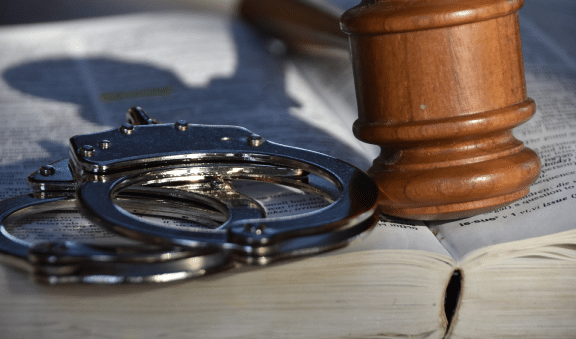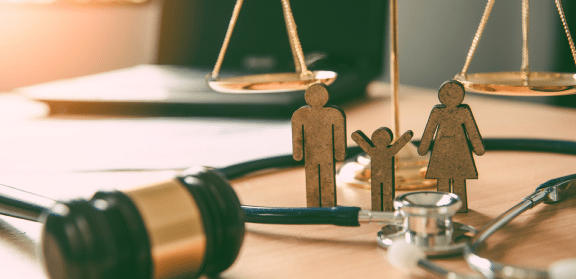What Does It Really Mean to Press Charges?
Survivors of sexual assault, abuse, and harassment often do not understand the process of reporting to law enforcement. We want to provide full transparency into what it is like to report to law enforcement and what role the survivor plays in the process.

Author: Kathryn Kosmides
Survivor Advocate
Home » What Does It Really Mean to ‘Press Charges’
When people think about the term “pressing charges”, there is an understanding that this involves the individual being charged with different criminal offenses within the criminal justice system. However, most individuals’ knowledge of what this means and the process ends there — and there is a lot of misinformation from television and the media (including social media) about this process.
Knowing more about the process can empower survivors of sexual assault, sexual abuse, sexual battery, sexual harassment, sexual misconduct and other harms to understand their rights and what to expect when deciding to report to law enforcement. Helping Survivors is here to answer key questions about the reality of pressing charges and dispels common misconceptions.
What Does It Mean to Press Charges Against Someone?
First, it is important to understand that an individual does not (and can not) press charges against someone.
Pressing charges refers to initiating criminal proceedings against an individual accused of committing a crime. A prosecutor is a lawyer who works for the state or federal government who is responsible for starting criminal legal proceedings against an individual. The official name for the position of state prosecutors is district attorney.
The job of a prosecutor is to review the evidence and testimony provided by law enforcement, witnesses, and potential victims and determine if charges will be pursued based on a variety of factors including available evidence and their belief in the ability to obtain a conviction.
When an individual files a report with law enforcement (also known as a police report), this essentially starts an investigation. Once law enforcement receives the report of a crime, officers investigate to determine what evidence is potentially available to support a criminal case. Prosecutors will then decide whether to press charges against the suspect.
The power to press charges belongs solely to a prosecutor, not the crime victim. This means that reporting a crime to law enforcement does not guarantee the individual will be charged, arrested, or convicted. Criminal cases are between the state and the accused individual (for example, The State of California vs. John Smith). The victim(s) are not a named party in the case.
However, the victim’s cooperation with prosecutors is generally necessary for a prosecution to proceed, especially for cases related to sexual violence. The victims typically are the greatest source of evidence and testimony.
- What Does It Mean to Press Charges Against Someone?
- What Happens When You Report to Law Enforcement
- Common Questions About Pressing Charges
- How Do the Police Decide To Investigate a Crime?
- How Does a Prosecutor Decide To Prosecute a Crime?
- What Happens if You Report a Crime but Charges Are Not Pressed?
- Options for Survivors to Get Help Outside of the Criminal Justice System
- Want to speak with a lawyer?
If a victim of a crime reports to law enforcement and criminal charges are brought by the prosecutor, the prosecutor (and potentially a team of lawyers that work for the state or federal government) are the lawyers for the case. While they do not represent the victim(s), they often work with victims to learn more about the case and their desires for the outcome.
This means that victims do not need to hire a lawyer to report a crime to law enforcement.
Victims are not named as a party in the case given the case is the state versus the accused individual. If a victim wishes to hire their own attorney, this attorney can help communicate details to law enforcement or the prosecuting attorney but can not press or pursue charges themselves and/or force the prosecution to do anything. Additionally, a survivor will typically have to pay out of pocket should they want this type of representation.
In most cases, it does not make sense and is not necessary for a victim of a crime to have legal counsel for a criminal prosecution against an individual. However, you may want to contact a lawyer or have legal representation if you are in an integrated family/criminal court or believe injustice is happening within the criminal legal system. If in an integrated court, your attorney will represent you in the family proceedings and the state prosecutor will represent the state (not you) in the criminal proceeding.
An attorney can protect the victim’s rights during the criminal justice process and separately pursue a civil action for personal injury against the perpetrator. Anyone can file a civil lawsuit against someone or an entity, whether or not the offense is reported to law enforcement or charges are filed.
The criminal justice system process generally results in a conviction, a plea deal, the dismissal of charges, or a not-guilty verdict. Many survivors do not understand how or why these decisions are made and may feel angry, frustrated, or upset if the outcome they wanted is not what ends up happening. The outcome of a criminal case is purely up to a jury and/or the judge overseeing the case.


What Happens When You Report to Law Enforcement
The specific process for reporting a crime to law enforcement can depend on the unique policies and processes of the jurisdiction where the harm happened. However, reporting a crime typically involves sharing available information about the offense to a police officer (either at a police station or the officer may come to your location) including the following details:
- Name and contact information of the victim
- Name and contact information of the accused
- The date, location, and time of the incident
- A testimony provided by the victim documented by a police officer (which will be a part of the official filed police report)
After receiving a criminal report, law enforcement may proceed to investigate and gather available evidence. The precise actions taken in a police investigation can vary based on the type of crime, circumstances, and local laws. Law enforcement may gather additional written or verbal statements from the victim, the accused, and any available witnesses. The collection of other evidence can include photos, video footage, phone records, and other forensics. This process can take weeks, months, or even years depending on a variety of factors, including the number of detectives, the available evidence (especially if a SANE exam – also known as a rape kit – must be tested), the current whereabouts of the accused, and if the accused has a known history of other harm including previous arrests or convictions.
After this stage, law enforcement presents the prosecuting attorney the available evidence and they evaluate the facts and decide if charges will be pursued. Unfortunately, according to RAINN, only 310 out of every 1,000 rapes are reported to law enforcement — and of those reported, only 5% of reported individuals will be arrested and only 2.5% will be incarcerated for sexual abuse related offenses.
This reality can be very jarring for survivors of sexual assault, abuse, or harassment. Survivors often want to prevent future harm to themselves and others, but the criminal justice system often has vast limitations in its ability to do this. Charges may not be pressed for a variety of reasons, but the most important thing for survivors to understand is that they are not in control of this process. What they are in control of is deciding to report and their own healing journeys.
Survivors deserve justice and healing. But they should not rely on a criminal justice system for this. By filing a report with law enforcement, the survivor of harm has what they can to prevent future harm against themselves and others, and that is something they should be proud of regardless of the outcomes.
Common Questions About Pressing Charges
Below are some other answers to common questions that individuals may have about the process of pressing criminal charges.
01
How Much Does It Cost To Press Charges?
There is no cost for the victim to report a crime to law enforcement. You do not need a lawyer to facilitate, initiate, or pursue this process. If the state or federal government decides to press charges, the prosecutor will represent the state in the criminal proceedings. Remember, this lawyer represents the state and not necessarily your interests. In some states, they are required to meet with a survivor to understand their desires for the outcome but they are not required to abide by the survivor’s requests.
02
Is It Worth Pressing Charges?
While pressing charges is outside the survivor’s control, the decision to file a police report is a personal choice. We believe it is often worth it for survivors to file a police report if they are in a safe place free from potential retaliation, and reporting the crime will help them in their healing process.
Pressing charges is a difficult decision for many victims for a variety of reasons. The prospect of facing the accused and testifying in court could make it feel as if you are reliving the experience. However, it is also not a necessity to have a victim testify on stand. This part of the process should not deter someone from reporting as it may not become an actual reality. If the prosecutor does want the victim to testify, they will work with you to ensure you understand the process and have a support system in place.
Resources are available to support victims of crime during the criminal prosecution process. While each state will have varying resources and options available, many nonprofit organizations and independent service providers offer counseling and other services to help protect individuals during this process emotionally, physically, and financially.
03
How Long Does It Take to Press Charges?
The precise timeline for a prosecutor to press charges after a police report is filed will vary based on the complexity of the investigation and other factors. In general, it could take anywhere from a few months to over a year for the prosecutor to determine if they will press charges.
How Do the Police Decide To Investigate a Crime?
Law enforcement often has some discretion in its decision to investigate a crime, including the depth and extent of that investigation. Factors influencing the police’s decision may include the applicable statute of limitations for pressing charges, the clarity of the facts and applicable law, whether there are other known victims, and whether the alleged assailant has a known criminal history. Police departments across the country are also understaffed and overworked, especially as it relates to the prosecution of sexually violent offenses. Given this unfortunate reality, they often have to make decisions to prioritize or focus on certain reports over others.

How Does a Prosecutor Decide To Prosecute a Crime?
Prosecutors have limited time and resources. The one question most prosecutors will ask when deciding to open a criminal case is whether it is a good use of the public’s resources to prosecute the individual.
Prosecutors will look at the available evidence, the police report, and other factors to evaluate the likelihood of a conviction. If a conviction seems unlikely, the prosecutor will likely not pursue a criminal case. The severity of the crime and history of the individual can also play a role in the prosecutor’s decision.
This can be hard for survivors to hear and to understand. While all sexual abuse, harassment, and assault is heinous, due to limited resources and prosecutorial requirements, most accused individuals will not be prosecuted. This does not mean the harm didn’t happen or that the survivor does not deserve healing and justice.
What Happens if You Report a Crime but Charges Are Not Pressed?
The state’s decision not to press charges after a police report is filed can be disheartening but is, unfortunately, due to factors outside of the victim’s control. For example, the statute of limitations on pressing charges could have lapsed, the prosecutor may have lacked the necessary evidence to move forward, or the prosecuting office may have lacked the proper resources to proceed with the case.
You can take comfort in knowing you did what you could by reporting to law enforcement and bringing awareness to the situation. You may also be able to further awareness of the individual’s misconduct outside of the criminal justice system. For example, you can report incidents of sexual assault or domestic abuse to online dating apps or social media platforms. You may also be able to pursue a civil lawsuit against the individual or an institution.
Pressing Charges After a Rideshare Assault
Sexual assaults that occur in rideshare vehicles often leave survivors overwhelmed, unsure of where to turn, and questioning whether they can or should press charges. If you were assaulted during an Uber or Lyft ride, it’s important to know that you are not alone — and that legal action may be possible against both the individual driver and the company. Helping Survivors can confidentially discuss with you the details of rideshare sexual assault to understand your options, and explore whether an Uber sexual assault lawsuit may be an appropriate course of action in your case.
Options for Survivors to Get Help Outside of the Criminal Justice System
Several other options may also be available to protect you or your family and get more help after experiencing sexual assault, child sexual abuse, or domestic violence.
Healing & Advocacy
Many organizations and programs help survivors heal through advocacy and access to important resources, such as the following:
- Therapy to cope with the trauma of the incident
- Finding safe and secure shelter
- Obtaining employment or access to government resources to support you and your family financially
- Support groups to help you heal through the shared experiences of others

Family Court
If you were married, dating, or related to the individual who caused harm, you may be able to pursue protection in family court. Family court often helps survivors of gender-based violence get an order of protection against an individual they had a familial relationship with (as defined by local jurisdictional laws). Family court is also where individuals file for divorce or seek custody of children. Most jurisdictions have a local family court assistance center or nonprofit that aids individuals with these processes.

Filing a Civil Lawsuit
Victims of rape or sexual assault may be able to recover compensation for their injuries and losses through a civil lawsuit. The recoverable damages include medical bills, property damage costs, lost wages, lost earning capacity, pain and suffering, and emotional distress. You may also seek a restraining order against the individual within civil court.
The decision to file a civil lawsuit can be difficult but may make sense if the incident was facilitated or known by an institution (such as an employer, university, etc…), caused significant bodily injury, expenses, emotional trauma, or other losses. Alternatively, it may not make sense if damages are hard or impossible to prove and there is no clear path to recovering monetary damages from the defendant. This can be the case when the assailant has minimal financial resources and poor job prospects. However, if some other party enabled the assault or abuse, such as an institution or employer, they may be held liable for your damages.
A personal injury attorney experienced with sexual assault and abuse can help you evaluate your legal options and file a claim if you are eligible. Helping Survivors can connect you with a knowledgeable and compassionate lawyer to evaluate your case.
Want To Speak With A Lawyer?


